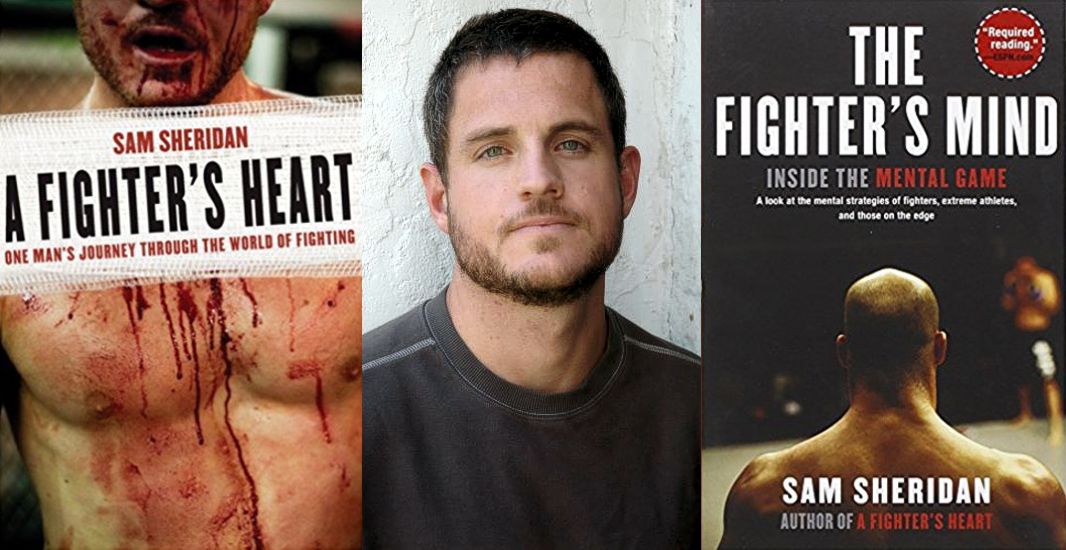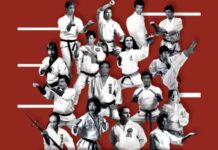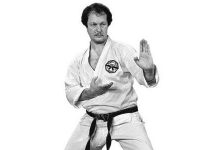The Fighter’s Mind: Inside the Mental Game
In his acclaimed national best seller, A Fighter’s Heart, Sam Sheridan took readers with him as he stepped through the ropes into the dangerous world of professional fighting. From a muay Thai bout in Bangkok to Rio, where he trained with jiu-jitsu royalty, to Iowa, where he matched up against the toughest in MMA, Sheridan threw himself into a quest to understand how and why we fight. In The Fighter’s Mind, Sheridan does for the brain what his first book did for the body. To uncover the secrets of mental strength and success, Sheridan interviewed dozens of the world’s most fascinating and dangerous men, including celebrated trainers Freddie Roach and Greg Jackson; champion fighters Randy Couture, Frank Shamrock, and Marcelo Garcia; ultrarunner David Horton; legendary wrestler Dan Gable, and many more. What are their secrets? How do they stay committed through years of training, craft a game plan, and adjust to the realities of the ring? How do they project strength when weak, and remain mentally tough despite incredible physical pain? A fascinating book, bursting at the seams with incredible stories and insight, The Fighter’s Mind answers these questions and many more.
Editorial Reviews
From Publishers Weekly
Sheridan (A Fighter’s Heart) examines what contributes toward a successful mental approach in professional fighting, interviewing people such as mixed martial arts icon Randy Couture, legendary college wrestling coach Dan Gable, and tai chi master Josh Waitzkin. The author gains some interesting insights from his investigation. Losing, it turns out, is a crucial component behind a fighter’s success. Confidence is fine, but ego is an evil thing, with humility being a great equalizer. Those interested in pugilistic psychology may find some value in Sheridan’s reporting; for others, too often the sources’ lessons sound similar, and the book frequently drifts into a lengthy, somnolent discourse on fighting styles. Sheridan also can’t stay out of his own way; his first-person prose is clunky and long-winded. His misguided attempt to merge elements of memoir and sports journalism derails the book, keeping it from succeeding in either genre. (Feb.)
Copyright © Reed Business Information, a division of Reed Elsevier Inc. All rights reserved. –This text refers to an alternate Paperback edition.
From Booklist
Starting with the premise, “We are all fighting something,” Sheridan follows his successful A Fighter’s Heart (2006) with a wide-ranging exploration of how great “fighters” succeed. Among those he profiles are 1972 Olympic gold-medal-winning wrestler Dan Gable, ultra-runner David Horton, mixed martial artist Randy Couture, 2004 Olympic gold-medal-winning boxer Andre Ward, and even chess wizard Josh Waitzkin (from Searching for Bobby Fischer). Some are defined not by their victories but by their defeats (boxer George Foreman); others need “killers in the room” (MMA champs); others win by a certain stealth (Ward)—not to mention thousands of hours of training. To explain just why these men do what they do, Sheridan says that fighting, in whatever forms that it takes, forces you to “learn who you are.” Like its predecessor, this book should find an audience well beyond the ring. –Alan Moores –This text refers to an alternate Paperback edition.
A Fighter’s Heart: One Man’s Journey Through the World of Fighting
In his acclaimed national best seller, A Fighter’s Heart, Sam Sheridan took readers with him as he stepped through the ropes into the dangerous world of professional fighting. From a muay Thai bout in Bangkok to Rio, where he trained with jiu-jitsu royalty, to Iowa, where he matched up against the toughest in MMA, Sheridan threw himself into a quest to understand how and why we fight. In The Fighter’s Mind, Sheridan does for the brain what his first book did for the body. To uncover the secrets of mental strength and success, Sheridan interviewed dozens of the world’s most fascinating and dangerous men, including celebrated trainers Freddie Roach and Greg Jackson; champion fighters Randy Couture, Frank Shamrock, and Marcelo Garcia; ultrarunner David Horton; legendary wrestler Dan Gable, and many more. What are their secrets? How do they stay committed through years of training, craft a game plan, and adjust to the realities of the ring? How do they project strength when weak, and remain mentally tough despite incredible physical pain? A fascinating book, bursting at the seams with incredible stories and insight, The Fighter’s Mind answers these questions and many more.
Editorial Reviews
From Publishers Weekly
Sheridan (A Fighter’s Heart) examines what contributes toward a successful mental approach in professional fighting, interviewing people such as mixed martial arts icon Randy Couture, legendary college wrestling coach Dan Gable, and tai chi master Josh Waitzkin. The author gains some interesting insights from his investigation. Losing, it turns out, is a crucial component behind a fighter’s success. Confidence is fine, but ego is an evil thing, with humility being a great equalizer. Those interested in pugilistic psychology may find some value in Sheridan’s reporting; for others, too often the sources’ lessons sound similar, and the book frequently drifts into a lengthy, somnolent discourse on fighting styles. Sheridan also can’t stay out of his own way; his first-person prose is clunky and long-winded. His misguided attempt to merge elements of memoir and sports journalism derails the book, keeping it from succeeding in either genre. (Feb.)
Copyright © Reed Business Information, a division of Reed Elsevier Inc. All rights reserved. –This text refers to an alternate Paperback edition.
From Booklist
Starting with the premise, “We are all fighting something,” Sheridan follows his successful A Fighter’s Heart (2006) with a wide-ranging exploration of how great “fighters” succeed. Among those he profiles are 1972 Olympic gold-medal-winning wrestler Dan Gable, ultra-runner David Horton, mixed martial artist Randy Couture, 2004 Olympic gold-medal-winning boxer Andre Ward, and even chess wizard Josh Waitzkin (from Searching for Bobby Fischer). Some are defined not by their victories but by their defeats (boxer George Foreman); others need “killers in the room” (MMA champs); others win by a certain stealth (Ward)—not to mention thousands of hours of training. To explain just why these men do what they do, Sheridan says that fighting, in whatever forms that it takes, forces you to “learn who you are.” Like its predecessor, this book should find an audience well beyond the ring. –Alan Moores –This text refers to an alternate paperback.
About the Author
Sam Sheridan joined the U.S. Merchant Marines after high school and then attended Harvard College, from which he graduated in 1998. He has written for Men’s Journal, Newsweek, and FIGHT!











